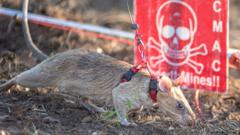Ronin, a five-year-old African giant pouched rat, has recently made history by becoming the first rodent to detect more than 100 landmines and various other unexploded ordnance in Cambodia. This remarkable achievement was recognized by the charity Apopo, which specializes in training such animals for humanitarian efforts. Since 2021, Ronin has successfully located 109 landmines and 15 remnants of unexploded munitions, proving invaluable in reclaiming hazardous land for the local population.
Cambodia still faces challenges due to millions of unexploded munitions left from the civil war that ended in 1998. The Guinness Book of World Records acknowledged Ronin’s contributions, emphasizing the impact his work has on communities that live in constant fear of stepping on buried explosives. Apopo, which is based in Tanzania, currently has a total of 104 HeroRATS, as they like to call their trained rats, all capable of detecting chemicals present in landmines.
The efficiency of these trained rodents is astonishing; they can inspect an area equivalent to a tennis court in about 30 minutes, while it would take a human with a metal detector up to four days to complete the same task. In addition to landmine detection, these rats are also trained to identify tuberculosis swiftly, providing an auxiliary benefit to public health.
Ronin's achievement surpasses that of his predecessor, Magawa, who detected 71 mines and received a gold medal for his bravery in 2020. Apopo has made significant strides since its inception 25 years ago, clearing a total of 169,713 landmines and explosives worldwide. In Cambodia alone, they have removed over 52,000 dangerous items, but a grim estimate still suggests that approximately four to six million landmines remain buried across the country. Apopo's mission extends beyond Cambodia to other war-affected nations, including Ukraine, South Sudan, and Azerbaijan, as they continue to promote safety and recovery in conflict-affected areas.
Cambodia still faces challenges due to millions of unexploded munitions left from the civil war that ended in 1998. The Guinness Book of World Records acknowledged Ronin’s contributions, emphasizing the impact his work has on communities that live in constant fear of stepping on buried explosives. Apopo, which is based in Tanzania, currently has a total of 104 HeroRATS, as they like to call their trained rats, all capable of detecting chemicals present in landmines.
The efficiency of these trained rodents is astonishing; they can inspect an area equivalent to a tennis court in about 30 minutes, while it would take a human with a metal detector up to four days to complete the same task. In addition to landmine detection, these rats are also trained to identify tuberculosis swiftly, providing an auxiliary benefit to public health.
Ronin's achievement surpasses that of his predecessor, Magawa, who detected 71 mines and received a gold medal for his bravery in 2020. Apopo has made significant strides since its inception 25 years ago, clearing a total of 169,713 landmines and explosives worldwide. In Cambodia alone, they have removed over 52,000 dangerous items, but a grim estimate still suggests that approximately four to six million landmines remain buried across the country. Apopo's mission extends beyond Cambodia to other war-affected nations, including Ukraine, South Sudan, and Azerbaijan, as they continue to promote safety and recovery in conflict-affected areas.


















